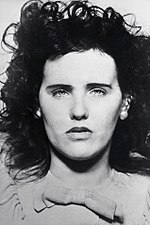Black Dahlia, Date of Birth, Place of Birth, Date of Death
TweetBlack Dahlia
American murder victim
 Date of Birth: 29-Jul-1924
Date of Birth: 29-Jul-1924
 Place of Birth: Hyde Park, Massachusetts, United States
Place of Birth: Hyde Park, Massachusetts, United States
Date of Death: 15-Jan-1947
Profession: actor, domestic worker, waiter
Nationality: United States
Zodiac Sign: Leo 
About Black Dahlia
- Elizabeth Short (July 29, 1924 – January 14 or 15, 1947), known posthumously as the "Black Dahlia", was an American woman who was found murdered in the Leimert Park neighborhood of Los Angeles, California.
- Her case became highly publicized due to the graphic nature of the crime, which included her corpse having been mutilated and bisected at the waist. A native of Boston, Short spent her early life in Medford, Massachusetts and Florida before relocating to California, where her father lived.
- It is commonly held that Short was an aspiring actress, though she had no known acting credits or jobs during her time in Los Angeles.
- She would acquire the nickname of the Black Dahlia posthumously (after the owner of a drugstore in Long Beach, California told reporters that male customers had that name for her), as newspapers of the period often nicknamed particularly lurid crimes; the term may have originated from a film noir murder mystery, The Blue Dahlia, released in April 1946.
- After the discovery of her body on January 15, 1947, the Los Angeles Police Department began an extensive investigation that produced over 150 suspects, but yielded no arrests. Short's unsolved murder and the details surrounding it have had a lasting cultural intrigue, generating various theories and public speculation.
- Her life and death have been the basis of numerous books and films, and her murder is frequently cited as one of the most famous unsolved murders in American history, as well as one of the oldest unsolved cases in Los Angeles County.
- It has likewise been credited by historians as one of the first major crimes in post-World War II America to capture national attention.
Read more at Wikipedia
See Also
- Famous People's Birthdays on 29 July, United States
- Famous People's Birthdays in July, United States
- Famous actor's Birthdays on 29 July, United States
- Famous actor's Birthdays in July, United States
- Famous domestic worker's Birthdays on 29 July, United States
- Famous domestic worker's Birthdays in July, United States
- Famous waiter's Birthdays on 29 July, United States
- Famous waiter's Birthdays in July, United States

